Introduction
Building muscle is a common objective for many individuals who engage in strength training. Achieving this goal requires dedication, both in the gym with challenging workouts and in the kitchen with a mindful diet. A key element is ensuring an adequate intake of protein, carbohydrates, and overall calories to support muscle growth.
While proper nutrition is crucial, sometimes it may be challenging to solely rely on food to meet your fitness goals efficiently. This is where supplements come into play. Among the various options available, creatine stands out as a highly popular choice. However, if you’re new to the world of supplements and not quite ready to try creatine, some alternatives to creatine that help in muscle development are discussed below.
Finding strategies that work best for you, such as optimizing your workout routine, incorporating compound exercises, maintaining consistent progressive overload, and prioritizing rest and recovery, can all contribute to gaining muscle effectively. Remember, building muscle is a journey that requires patience, consistency, and a holistic approach combining both nutrition and exercise.
In this comprehensive guide, we will explore the best creatine alternatives available. From natural sources like red meat and poultry to performance-enhancing supplements such as L-glutamine powder and beta-alanine, this guide will provide you with a range of options to consider for your fitness journey.

What is a Creatine?
Creatine is a naturally occurring compound found in the body that plays a crucial role in energy production during high-intensity exercise. It is primarily stored in the muscles and can also be obtained through certain foods like meat and fish. Creatine supplements are widely used to enhance athletic performance, increase muscle mass, and improve strength and power output.
What are Creatine Supplements?
Creatine supplements are popular dietary supplements used by athletes and fitness enthusiasts. They contain creatine, a naturally occurring compound in the body that helps with energy production during high-intensity exercise. These supplements can enhance performance, increase muscle mass, and improve strength and power output. However, it’s important to consult with a healthcare professional before starting any new supplementation regimen.
It’s important to note that while creatine supplementation has been extensively studied and is generally considered safe for most individuals, it may not be suitable for everyone. It’s recommended to consult with a healthcare professional before starting any new supplementation regimen.
What are the Creatine Alternatives?
Creatine alternatives are various substances or supplements that can be used as alternatives to traditional creatine supplementation. These alternatives aim to provide similar benefits in terms of muscle building, strength, and performance enhancement. Here are some popular creatine alternatives:
- AlphaBulk by Olympus Labs: A powerful muscle-building supplement designed to support lean muscle growth and protein synthesis.
- Tri-Creatine Malate: A blend of creatine and malic acid, believed to enhance energy production.
- Kre-Alkalyn: A pH-buffered creatine supplement that claims to be more stable and less likely to convert to creatinine.
- Branched-chain amino acids (BCAAs): Essential amino acids that aid in muscle recovery, reduce muscle soreness, and promote muscle growth.
- Whey protein: A high-quality protein supplement known for its muscle-building properties and fast absorption.
- Caffeine: A popular stimulant that increases energy, focus, and exercise performance.
- Beta-alanine: An amino acid that enhances muscular endurance, reduces fatigue, and improves workout performance.
- Coenzyme Q10: An antioxidant that supports cellular energy production, potentially benefiting exercise performance and recovery.
1. AlphaBulk
AlphaBulk is a premium muscle-building supplement designed to support and enhance your fitness goals. With its powerful blend of ingredients, AlphaBulk helps optimize muscle growth, increase strength, and improve workout performance.
AlphaBulk is recommended to be used during periods of intense training or when the goal is to increase muscle mass. Whether you’re a professional athlete or a fitness enthusiast, AlphaBulk is the perfect companion to take your training to the next level and achieve impressive results. Experience the benefits of AlphaBulk and unlock your full potential in the gym.
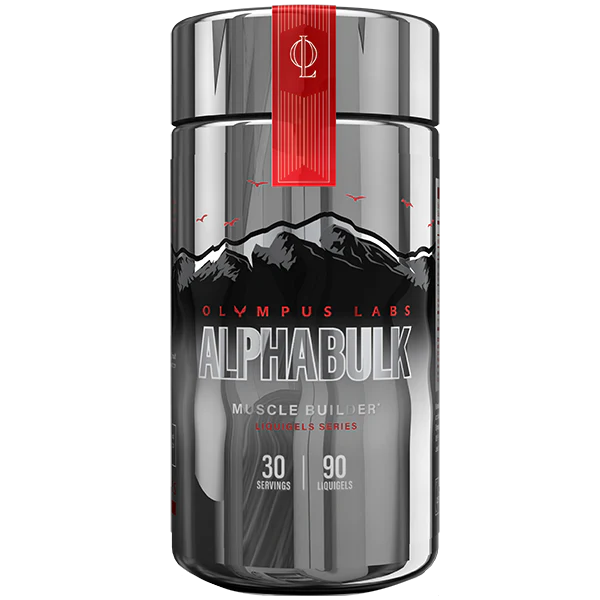
Benefits
- Enhanced Muscle Protein Synthesis: AlphaBulk contains ingredients that help stimulate muscle protein synthesis, promoting muscle growth and development.
- Increased Strength and Power: The powerful formula of AlphaBulk can help improve strength and power output, allowing for more productive workouts and enhanced athletic performance.
- Improved Muscle Recovery: AlphaBulk aids in reducing muscle damage and promoting faster recovery after intense training sessions, allowing for more frequent and effective workouts.
- Potential Improvements in Body Composition: With consistent use and proper nutrition and exercise, AlphaBulk may contribute to improved body composition, helping to increase lean muscle mass while reducing body fat.
2. Tri-Creatine Malate
Tri-Creatine Malate is a powerful supplement that combines creatine with malic acid to enhance muscle growth and performance. This unique blend provides the benefits of both compounds, supporting increased strength, endurance, and muscle mass.
Tri-Creatine Malate helps replenish ATP stores in the muscles, leading to improved energy output during workouts. By promoting faster recovery and reducing muscle fatigue, this supplement aids in maximizing muscle gains.
Incorporating Tri-Creatine Malate into your fitness routine can help you reach your muscle-building goals more effectively.
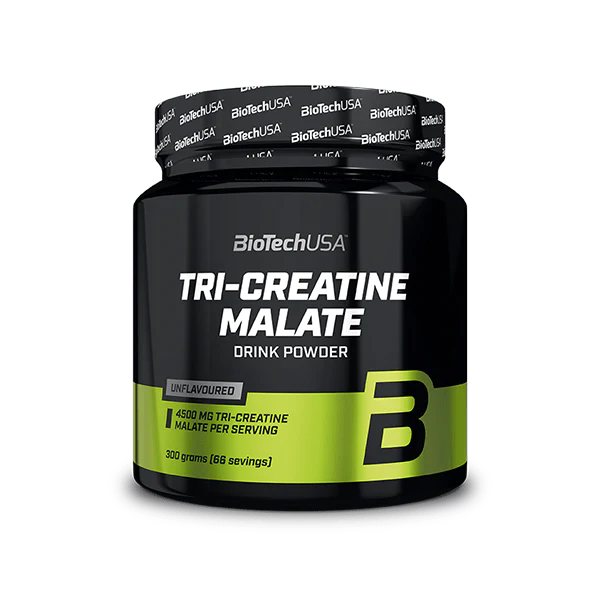
Benefits
- Increased Strength and Power: Tri-Creatine Malate can help improve strength and power output, allowing you to lift heavier weights and perform at a higher intensity.
- Enhanced Muscle Endurance: By increasing the availability of ATP (adenosine triphosphate) in muscle cells, Tri-Creatine Malate may delay fatigue, enabling you to push through more reps and sustain your performance for longer periods.
- Improved Muscle Recovery: Tri-Creatine Malate supports faster muscle recovery by replenishing the energy stored in muscle cells, reducing post-workout fatigue, and promoting optimal muscle repair and growth.
- Enhanced Muscle Volumization: Tri-Creatine Malate has the potential to increase muscle cell volume, resulting in a fuller and more pumped appearance.
3. Kre-Alkalyn
Kre-Alkalyn is a pH-correct creatine supplement that is designed to provide benefits in strength, muscle growth, and athletic performance. With its unique formulation synthesized to pH 12, Kre-Alkalyn offers the advantage of increased stability and reduced conversion to creatinine in liquids.
This supplement is popular among athletes and bodybuilders who aim to maximize their muscle gains, enhance power output, and improve overall physical performance.
By supporting muscle growth and providing a buffered form of creatine, Kre-Alkalyn can help optimize workout results and contribute to achieving fitness goals effectively.

Benefits
- Increased Muscle Strength: Kre-Alkalyn has been shown to enhance muscle strength, allowing you to lift heavier weights and push yourself harder during workouts. This can lead to greater gains in muscle size and overall strength.
- Improved Power Output: Kre-Alkalyn helps improve power output, which is crucial for activities that require explosive movements, such as sprinting or weightlifting. By increasing your power output, Kre-Alkalyn can help you perform at a higher level and achieve better results.
- Reduced Water Retention: Unlike other forms of creatine, Kre-Alkalyn is less likely to cause water retention, which can make you look bloated or puffy. This makes it a popular choice for athletes and bodybuilders who want to avoid the unwanted side effects of traditional creatine supplementation.
- Enhanced Endurance: Kre-Alkalyn has been found to improve endurance, allowing you to exercise for longer periods without feeling fatigued. This can be especially beneficial for endurance athletes or individuals participating in high-intensity interval training (HIIT) workouts.
4. Branched-chain amino acids (BCCAs)
Branched-chain amino acids (BCAAs) are a group of essential amino acids used as a dietary supplement for various reasons. They are known to play a crucial role in muscle protein synthesis, which is the process of building and repairing muscles. By supplementing with BCAAs, individuals aim to enhance muscle growth, reduce muscle soreness, and improve exercise performance.
These amino acids are also believed to help prevent muscle breakdown during intense physical activity or periods of calorie restriction. Some studies suggest that BCAA supplementation may aid in reducing fatigue and improving endurance during prolonged exercise.
Additionally, BCAAs have been associated with potential benefits for individuals following a low-protein diet, promoting muscle recovery after surgery or injury, and supporting overall muscle health in aging populations.
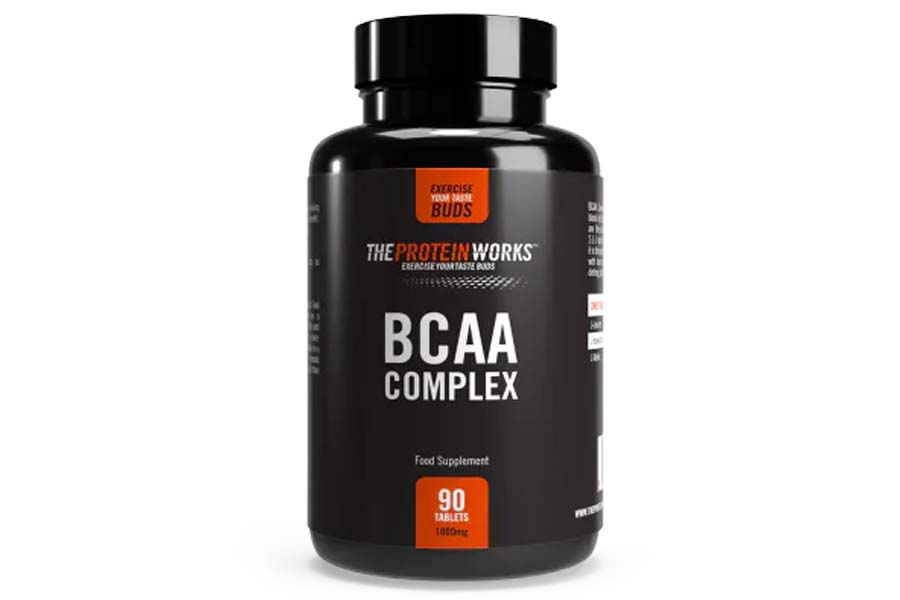
Benefits
- Muscle Protein Synthesis: BCAAs stimulate muscle protein synthesis, the process by which new muscle proteins are formed. This is vital for muscle repair, recovery, and growth after intense workouts.
- Reduced Muscle Breakdown: BCAAs can help reduce muscle breakdown or catabolism, especially during prolonged exercise or periods of calorie restriction. By preserving muscle tissue, BCAAs help maintain muscle mass and promote overall muscle growth.
- Increased Energy and Endurance: BCAAs can be used as an energy source during exercise, sparing glycogen stores in the muscles. This can delay fatigue and improve endurance, allowing you to train harder and longer, ultimately leading to greater muscle gains.
- Faster Recovery: BCAAs have been shown to reduce muscle soreness and promote faster recovery. By reducing exercise-induced muscle damage and inflammation, BCAAs can help you bounce back quicker from intense workouts, enabling more frequent training sessions and enhanced muscle growth.
However, it’s important to note that while BCAAs can be beneficial, they should not be seen as a substitute for a balanced diet or proper training program. As with any supplement, it’s best to consult with a healthcare professional before adding BCAAs to your routine to ensure they align with your specific health needs and goals.
5. Whey Protein
Whey protein is a widely popular supplement for bodybuilders and individuals seeking to promote muscle growth. It is often challenging to consume enough protein throughout the day, especially for those with busy schedules. However, protein powder offers an affordable and easily accessible solution, available in various flavors ranging from unpleasant to enjoyable depending on the brand.
To ensure optimal muscle growth and recovery, incorporating whey protein into your routine can be beneficial. It provides a convenient and efficient way to meet your protein requirements, supporting the rebuilding and growth of muscles. By supplying the necessary amino acids, whey protein assists in maximizing the benefits of your workouts and helps you achieve your muscle-building goals.
Remember, while whey protein is a valuable supplement, it should be used in conjunction with a balanced diet and regular exercise. Consulting with a healthcare professional or registered dietitian is advisable to determine the appropriate usage and dosage based on individual needs and goals.

Benefits
- Muscle Building: Whey protein is rich in essential amino acids, particularly leucine, which plays a crucial role in stimulating muscle protein synthesis. This can aid in muscle growth and repair.
- Weight Loss Support: Consuming whey protein can help promote satiety and reduce appetite, making it beneficial for weight loss or weight management goals.
- Improved Recovery: Whey protein provides the necessary amino acids to support muscle recovery after intense exercise, reducing muscle soreness and promoting faster healing.
- Immune System Boost: Whey protein contains the amino acid cysteine, which helps raise glutathione levels in the body. Glutathione is an antioxidant that supports immune function and overall health.
It’s important to note that individual results may vary, and whey protein should be used as part of a balanced diet and exercise routine. Consulting with a healthcare professional or registered dietitian is recommended to determine the appropriate usage and dosage based on individual needs and goals.
6. Caffeine
Caffeine is a popular and widely consumed supplement known for its stimulating effects on the central nervous system. It is naturally found in various plants, such as coffee beans, tea leaves, kola nuts, and cacao beans. When used as a supplement, caffeine offers several potential benefits:
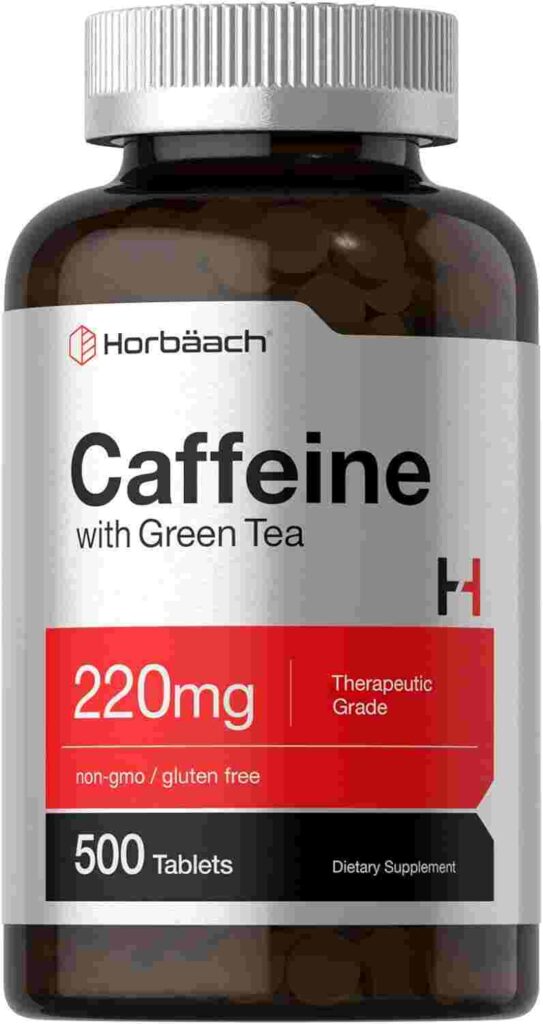
Benefits
- Increased Energy and Alertness: Caffeine acts as a stimulant by blocking adenosine receptors in the brain, which reduces feelings of fatigue and drowsiness. This leads to increased wakefulness, improved focus, and enhanced mental alertness.
- Improved Physical Performance: Caffeine has been shown to enhance physical performance and endurance in both aerobic and anaerobic activities. It can stimulate the release of adrenaline, increase heart rate, and improve muscle contractions, allowing individuals to exert themselves at higher levels for longer durations.
- Enhanced Cognitive Function: Caffeine can improve cognitive function, including memory, attention, and reaction time. By inhibiting adenosine receptors, it promotes mental clarity and enhances brain activity, leading to improved concentration and mental performance.
- Fatigue Delay: Caffeine can delay the onset of fatigue, making it beneficial for individuals engaged in demanding physical or mental tasks. By blocking adenosine receptors and increasing dopamine production, caffeine helps maintain energy levels and delay the feeling of exhaustion.
- Appetite Suppression: Caffeine has mild appetite-suppressing properties, which may be helpful for those aiming to manage their weight. It can temporarily reduce feelings of hunger and increase feelings of fullness, potentially aiding in calorie control.
- Metabolism Boost: Caffeine has been found to increase metabolic rate and promote thermogenesis, potentially leading to a slight increase in calorie burning and fat oxidation. However, the effects may vary among individuals.
It’s important to note that individual responses to caffeine can differ, and some individuals may be more sensitive to its effects or experience side effects such as jitteriness, increased heart rate, anxiety, or sleep disturbances. Additionally, long-term excessive consumption of caffeine may lead to dependency and tolerance. It’s advisable to moderate caffeine intake, consider personal tolerance levels, and consult with a healthcare professional if there are any concerns or underlying health conditions.
7. Beta-alanine
Beta-alanine is a non-essential amino acid that is commonly used as a supplement to enhance athletic performance and support muscle endurance. It serves as an alternative to creatine, another popular supplement used for similar purposes. Here is a description of beta-alanine and its potential benefits:
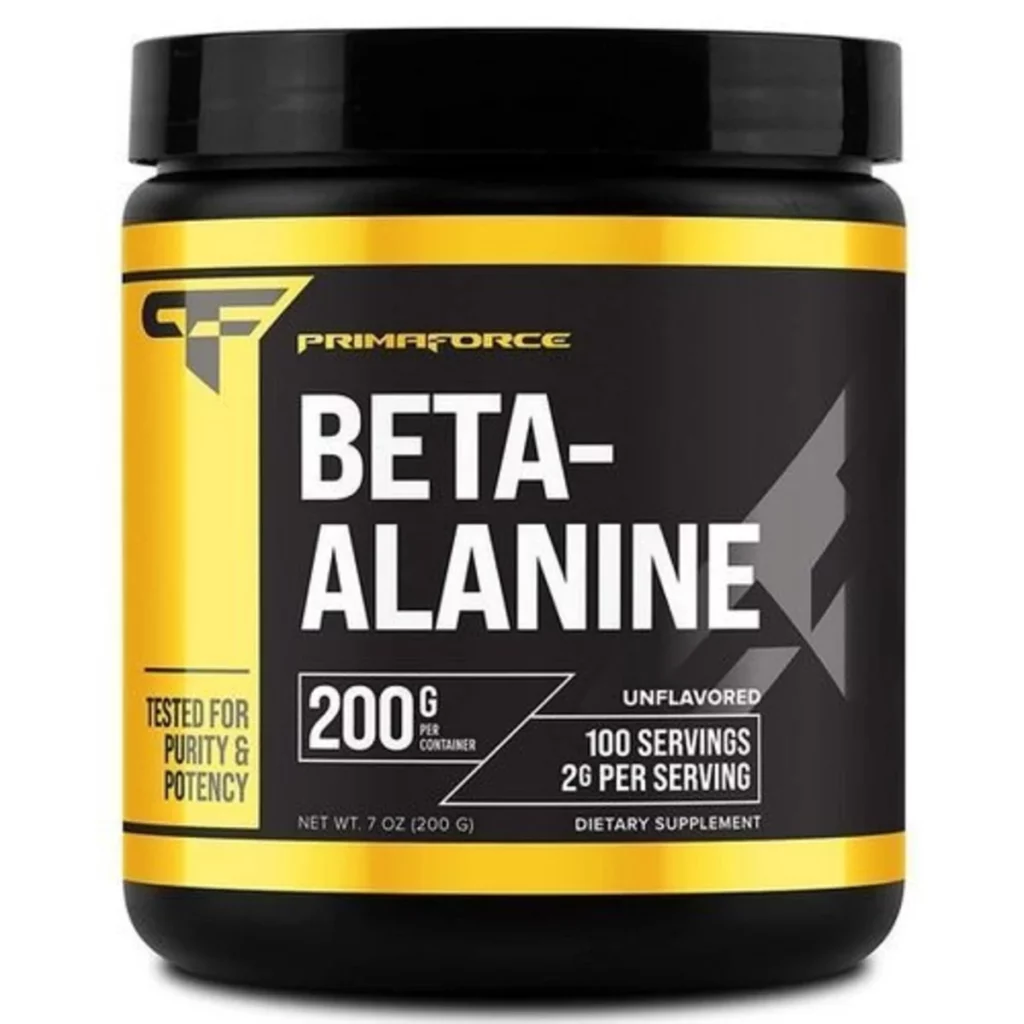
Benefits
- Improved Exercise Performance: Beta-alanine is known to increase muscle carnosine levels, which can help buffer the build-up of lactic acid during high-intensity exercise. By reducing muscle acidity, beta-alanine supplementation may enhance exercise performance and delay fatigue, allowing individuals to push harder and longer during workouts.
- Increased Muscle Endurance: Beta-alanine has been found to improve muscle endurance, especially during activities that involve short bursts of intense exercise. It can help delay the onset of muscle fatigue, allowing for more repetitions or extended exercise durations before exhaustion sets in.
- Enhanced Muscle Strength: Research suggests that beta-alanine supplementation may have a positive impact on muscle strength, particularly when combined with resistance training. It can potentially lead to greater gains in muscle mass and strength compared to just relying on training alone.
- Support for Anaerobic Activities: Beta-alanine is particularly beneficial for sports or activities that require repeated bouts of explosive movements, such as sprinting, weightlifting, and high-intensity interval training (HIIT). By improving muscle endurance and delaying fatigue, it can help athletes perform at their best during these anaerobic exercises.
Remember, supplements like beta-alanine should be used in conjunction with a well-rounded, whole-food-based diet and regular exercise routine. It’s always best to consult with a healthcare professional before starting any new supplement regimen.
8. Coenzyme Q10
Coenzyme Q10, often referred to as CoQ10, is a naturally occurring compound found in every cell of the body. It plays a vital role in energy production within cells and is involved in numerous biological functions. While not a direct alternative to creatine, CoQ10 has gained attention for its potential benefits in various areas, including energy metabolism, cardiovascular health, and antioxidant properties

To use a Coenzyme Q10 (CoQ10) supplement:
- Consult with a healthcare professional for personalized guidance.
- Choose the right formulation (capsules, tablets, etc.) that suits your preference.
- Follow the recommended dosage on the product label.
- Consider taking it with a meal containing fat for better absorption.
- Take it consistently over time to experience potential benefits.
- Inform your healthcare professional about any medications you’re taking to check for interactions.
Benefits
- Energy production: CoQ10 plays a vital role in cellular energy production, helping to generate adenosine triphosphate (ATP). Adequate levels of CoQ10 may support overall energy levels and cellular function.
- Heart health: CoQ10 is concentrated in the heart muscle and has been linked to cardiovascular health. It may help maintain normal blood pressure, support healthy cholesterol profiles, and act as an antioxidant to protect against oxidative stress.
- Antioxidant properties: CoQ10 exhibits potent antioxidant properties, helping to neutralize harmful free radicals. By reducing oxidative stress, it may contribute to reducing inflammation and supporting overall cellular health.
- Exercise performance and recovery: While not a direct alternative to creatine, CoQ10 supplementation may benefit exercise performance and recovery. It is believed to enhance mitochondrial function, improve oxygen utilization, and assist in reducing exercise-induced oxidative stress.
Why You Need Extra Creatine?
Creatine is a naturally occurring compound that plays a vital role in energy production, particularly during high-intensity activities. While the body can produce its creatine, there are several reasons why you might need extra creatine:
- Increased Exercise Performance: Creatine supplementation has been shown to enhance exercise performance, especially in activities that require short bursts of intense effort, such as weightlifting, sprinting, and jumping. It helps replenish ATP (adenosine triphosphate) stores, which are essential for muscle contraction.
- Muscle Growth and Strength: Creatine has been extensively studied for its ability to promote muscle growth and enhance strength. Increasing phosphocreatine levels in the muscles, it can facilitate greater power output and stimulate muscle protein synthesis, leading to muscle hypertrophy.
- Enhanced Recovery: Creatine supplementation may help improve post-exercise recovery by reducing muscle damage and inflammation. It can also aid in replenishing glycogen stores, allowing for faster recovery between intense training sessions.
- Brain Function and Cognitive Health: Research suggests that creatine plays a role in brain function, memory, and cognitive health. Supplementing with creatine has been shown to improve cognitive performance, especially in tasks that require short-term memory and quick thinking.
- Vegetarian or Vegan Diet: Since creatine is mainly found in animal products, individuals following a vegetarian or vegan diet may have lower creatine levels. Supplementing with creatine can help offset this deficiency and provide the benefits associated with optimal creatine levels.
It’s important to note that while creatine supplementation can be beneficial for many individuals, it may not be necessary or suitable for everyone. Consult with a healthcare professional or registered dietitian to determine if creatine supplementation is right for you.
Natural alternatives to Creatine
If you want to increase your creatine intake naturally, here are some key ways to do so:
- Red Meat: Beef, veal, lamb, venison, and rabbit are excellent sources of natural creatine.
- Fish: Fish such as salmon, tuna, cod, herring, and others contain significant amounts of creatine.
- Poultry: Chicken is a good source of creatine, providing a moderate amount compared to red meat and fish.
- Seafood: Seafoods like herring, salmon, tuna, cod, and shrimp also contain creatine.
- Plant-Based Options: While creatine is mainly found in animal products, small amounts can be obtained from certain plant-based sources like pumpkin seeds.
It’s important to note that the levels of creatine in these foods may vary. Including a variety of these natural sources in your diet can help ensure an adequate intake of creatine.
Creatine Cautions
When considering creatine supplementation, it’s important to keep the following cautions in mind:
- Stay hydrated to prevent dehydration as creatine can increase water retention in muscles.
- Individuals with kidney conditions should exercise caution and consult a healthcare professional beforehand.
- Some people may experience digestive issues such as bloating or upset stomach. Starting with a lower dosage can help minimize these effects.
- Creatine may interact with certain medications, so it’s important to check for potential interactions.
- Limited research is available on the safety of creatine in children and pregnant or breastfeeding women.
Frequent Question Answers
By addressing the following frequently asked questions, we hope to provide clarity and guidance on incorporating the alternatives to creatine into your fitness routine. Remember to listen to your body, start at an appropriate level, and gradually progress for optimal results.
| Question | Answer |
|---|---|
| What is the best alternative to creatine? | Some popular alternatives to creatine include L-glutamine, agmatine sulfate, and pump-n-grow muscle supplements. However, it’s important to note that the effectiveness of these alternatives may vary for different individuals. |
| What brands of creatine are best? | Some well-known and reputable brands of creatine include MuscleTech, Optimum Nutrition, and BulkSupplements. It’s always advisable to choose brands that have good reviews, are tested for quality, and meet your specific needs. |
| What is better than taking creatine? | The concept of “better” depends on individual goals and preferences. Some people prefer alternatives like L-glutamine or agmatine sulfate, while others find creatine to be the most effective. It’s best to experiment and find what works for you. |
| How much creatine is safe for the kidneys? | When taken within recommended dosages, creatine is generally safe for healthy individuals, including those with normal kidney function. However, if you have pre-existing kidney conditions, it’s best to consult a healthcare professional beforehand. |
| Do eggs have creatine? | Yes, eggs do contain small amounts of creatine. While it’s not a significant source, eggs are a nutritious food that provides various other nutrients beneficial for overall health and muscle function. |
Conclusion
In conclusion, exploring creatine alternatives can provide individuals with additional options to support their fitness goals. Alternatives like L-glutamine and agmatine sulfate offer potential benefits such as improved muscle recovery and enhanced performance.
By trying different alternatives, individuals can find what works best for them. It is important to consult with a healthcare professional before starting any new supplement.
So, explore the world of creatine alternatives, find what resonates with you, and unlock your full potential in your fitness journey!
Sources
- The Best Creatine Alternatives For Your Workout Routine
- 4 Best Creatine Alternatives to Build Muscle and Strength
- Supplements with Similar Uses as: Creatine
- Natural Creatine: The 5 Best Food Sources
- Creatine Alternatives: What Are The Options? – Kimura Athletic
- The Best Creatine Alternatives For Muscle Building & Energy
- Alternatives To Creatine
- The Best Alternatives To Creatine For Building Muscle and Energy
- What is a creatine alternative?





